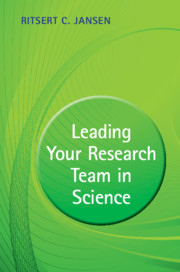Research can move the frontiers of knowledge if – and only if – the new knowledge is properly transferred to users who want or need it. This is what academia is all about.
The word “academia” derives from Greek Ἀκαδήμεια. This was a domain dedicated to the Athenian hero Akademos at a site with a καδημία, a sanctuary dedicated to Athena, the goddess of wisdom. Here Plato founded his school of philosophy around 387 BC. The word “philosophy” derives from Greek φιλοσοφία, originally meaning “love of wisdom,” and the word “school” derives from Greek σχολή, originally meaning “leisure.” Plato’s disciples – wealthy men who had leisure – came of their own free will to the school of philosophy to gather knowledge and think critically about it.
Many centuries later you run your own “school of philosophy” in academia. You train your Bachelor’s and Master’s degree students, PhD candidates, and postdocs. This costs you time that, in return, leverages your research.
Every year there is an enormous influx of new students and a major outflow of an educated workforce. Helping all these (early-career) people make the right career choices and fully develop their talents is crucial to them and to society – and for your research too. Some students show a talent for science, and such students will make your heart beat faster. A very small fraction of motivated students (<1 percent) is invited to extend their career in science, and they may work with you for some time: a Bachelor’s degree student becomes a research Master’s degree student and later a PhD student. Very few go on to become full professors. The students and postdocs are your workforce, and they help you boost your research output until they bid you farewell for a new position – in academia or elsewhere. If you are the team leader, then you have a critical responsibility for educating your team members to prepare them not only for their role on your team but also for their next career step. The career pyramid in science is steep; many postdocs and assistant and associate professors on tenure-track positions will have to continue their careers outside academia. The university is a “learning and teaching” environment, and saying farewell to most people is just part of the business model. This is an unfortunate knowledge drain from the researcher’s viewpoint, but this is why the government is able to dedicate financial resources specifically to you and your peers in academia.
Your educational responsibilities go beyond students and team members. As soon as the frontiers of knowledge have moved – which is what you are aiming to achieve – you also have to disseminate this new knowledge to those who have already left: the alumni of your and other universities. Lifelong learning is increasingly important in today’s knowledge-based society.
You have a responsibility not only to those who have left but also to those who are considering joining: high school students. Only with your help can they make a rational choice to study at university. Good for them! Good for society! The benefit to you? A better fit between you and your students and a better resource from which to recruit your future students and team members.
How about the nonexperts, the lay audience, the men and women on the street – do you need to educate them? They often lack the basic background and may not understand the keywords used in your research. Still, the general public should be able to get a basic understanding of what your research is about. After all, they’re paying for your research with their taxes. As citizens, they also vote, and via their elected politicians, they will decide about society’s grand challenges, their translation into research agendas, and the allocation of budgets for university research and business. Imagine how this might work out if your type of research is not on the agenda.
You have a lot of freedom in academia, so be entrepreneurial: show initiative, and develop your strategy to make the most of your “business.” But there’s only so much you can know and handle yourself. Luckily, support staff can offer crucial expertise and extra hands. Therefore, a first step in your strategy should be to establish and nourish productive relationships with them. Turn your “business” into a joint venture!



